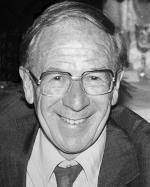Obituary
Derrick Rowley (1922-2004) A distinguished academic and researcher, Derrick Rowley was Emeritus Professor of Microbiology and Immunology at the University of Adelaide. He was highly regarded by his peers and others who knew him. For more than 28 years, Derrick was one of the most active, outspoken and productive members of the Australian community of immunologists. He contributed to biomedical and health science, first in England and then in Australia in many ways. Throughout his working life he was also involved with aspects of medical research as a whole, argued strongly for additional funds to support research in Australia and never ceased to work towards maintaining standards of scientific excellence in research. Derrick was born into a working class family in Bradford, Yorkshire. He won a scholarship to Bradford Grammar School for the final seven years of his schooling. Encouraged to continue studies in chemistry, in 1938 he enrolled for a BSc degree at Bradford Technical College, again with a scholarship. He completed the final BSc Honours examinations in 1941 at the Imperial College in London and took up a research position with Petrochemicals, initially in Manchester, and then for about a year in London and Orpington. During this time Derrick completed his PhD (1945), as an external student of London University. While in London he had the opportunity to work at the Glaxo Laboratories, where he met Sir Alexander Fleming, the discoverer of penicillin. This changed the course of Derrick's scientific life to a lifelong commitment and interest in research in biomedical science. In mid 1945 he took up a part-time research position in Fleming's laboratory at St Mary's Hospital, London, and also began studies in medicine that he completed in 1950. After a year of research in America, supported by a Harkness Fellowship, Derrick returned to the Wright Fleming Institute in London and was soon appointed head of the Department of Bacterial Chemistry. Derrick and family arrived in Adelaide at the beginning of 1960 to take up the newly established Chair of Microbiology at the University of Adelaide, a position he held until retirement at the beginning of 1988. Under his enthusiastic leadership the department increased in size more than eight-fold and changed its name to the Department of Microbiology and Immunology, to reflect its broader range of interests. In 1970 Derrick was instrumental in founding the Australian (now Australasian) Society for Immunology and was elected its first President. He remained actively involved after his term as President and the Society recognised the value of his contributions by making him an Honorary Life Member. He also had a long association with the Australian Journal of Experimental Biology and Medical Science (renamed Immunology and Cell Biology in 1988), acting as Editor-in-Chief from 1963 till the end of 1987. He also served on the National Health and Medical Research Council for six years. His research in enteric infections and the properties of bacteria that enable them to colonize and grow in animals, including humans, earned him a fine reputation throughout the world. He was appointed to a number of World Health Organization (WHO) advisory positions, including that of Chairman of the WHO Committee of Diarrhoeal Disease Research. In 1965 he was appointed as the Australian representative on the Advisory Board of the Cholera Research Laboratory in Bangladesh and subsequently served as Chairman of the Scientific Program Committee of the International Centre of Diarrhoeal Diseases Research, based in Bangladesh. Despite a dislike of committee work and meetings, his management skills led him into university administration, including a three-year term as Dean of the Faculty of Medicine. Derrick continued to use his expertise in various ways after he retired. He served as the Chairman of Council of the Child Health Research Institute (1988-1992), worked as a half-time Research Director of Enterovax Research Pty Ltd (1988-1989) and as Research Director and Research Adviser at the Queen Elizabeth Hospital for a further five years. He also worked as a consultant and joined a small group responsible for recommending how the primary health care services for Tibetans living in India might be improved and as an advisor to a project funded by AUSAID to establish a data collection system for medical problems of Tibetans in India. In 1993 he was made a member of the Order of Australia, in recognition of his contributions to immunology. Derrick is survived by his wife Betty, two daughters, a son and their families.
|





